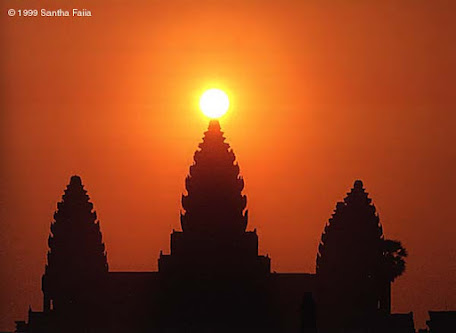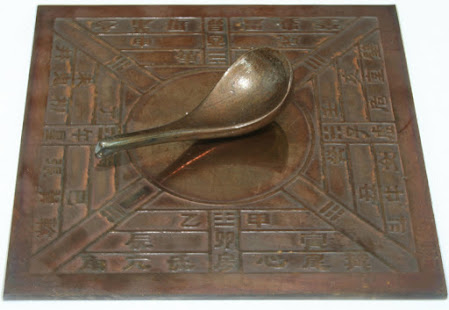ASTROGEOMANCY, GEOMANCY
AND FENG SHUI
Survival and Universality of the Prehistoric Science of Space Harmonisation
© Xavier de la Huerga 2023
The word astrogeomacy is a neologism formed by three particles; astro and geo - referring to the stars and the earth – and mancy, from the Greek word manteia, which is commonly translated as "method to divine the future”. However, in the context of the word astrogeomancy, this last particle has another meaning.
Divination in Time – Divination in Space
Geomancy, literally means "earth divination" and is broadly defined as the art of divining future events by means of markings, figures and lines randomly formed upon the surface of the earth or by the interpretation of landscape features. Thus, it would be logical to think of astrogeomancy as a variation of geomancy that uses astrology or astronomy. However, astrogeomancy has nothing to do with divining the future and everything with recovering the memory of our prehistoric past, it concerns itself with the reconstruction, study and application of the knowledge used to create the megalithic monuments and, most crucially, with the reactivation of the perceptual mode and consciousness possessed by their architects; a mode of unified perception with the cosmos that allows the human being to act as an agent of evolutive consciousness; a holistic awareness to which humankind is returning, as this age of exacerbated materialism and dehumanizing technologies gives way to a deeper understanding of the inextricable bond between spirituality and nature.
The table above portrays the 16 geomantic figures into which the ancient shamanic system of divination evolved within the Western hermetic tradition. (Image: www.psychicscience.org)
On the other hand and since the mid 20th century, the meaning of geomancy has been extended to encompass practices like dowsing or radiesthesia, a form of “divination in space” commonly centred on the subsoil or on the human body for therapeutic ends. Likewise, so-called ley lines, lung mei (dragon paths) or telluric currents and the attendant concept of a planetary grid formed by those invisible energy lines and embodying the concept of a subtle spiritual body for the Earth, also fall nowadays under the term geomancy.
In the same way, the disciplines of vaastu shastra and feng shui are commonly referred to as Indian and Chinese geomancy, respectively. They both have prehistoric origins and share with astrogeomancy several elements that are distinctive of the megalithic methodology; such as the fusion of sacred geometry, astronomy and metrology together with a multidimensional use of number and the integration of structures within the surrounding landscape and geology.
Angkor Vat is the biggest temple in the world (162 hectares and more than a thousand buildings). It was built following the canon and methodology of Vaastu Shastra. The transcendentally beautiful positioning of the Sun during the equinoxes shows the astrogeomantic principle of alignment, simultaneously astronomical and spiritual (Imagen:©1999 Santha Faiia. wwwhttps://grahamhancock.com).
Feng Shui and Chi
Feng shui (wind water) considers the omnipresence of Chi – a subtle energy that affects human beings and is susceptible of modification – as a starting point for the analysis and subsequent prescription of a geographic place or habitable space, with the purpose to harmonize and optimize its use. The principles of feng shui have been utilised during millennia to locate, design and build all the capital cities of China, its temples, sacred enclosures, palaces, tombs, community spaces, agricultural plots, roads. Its origins are fused with those of Taoism, 4,000 years ago at the very least.
The concept of Chi is not easily explainable to the modern mind dominated by the left cerebral hemisphere and spiritually buried under the paradigm of scientific materialism, from which it is encouraged to distrust its intuition. Chi is mostly spoken of as a force or energy, although the original methodology of feng shui seems to be describing something more akin to a morphic resonance field, when it tells us that in order to harmonize and balance Chi, the strategy to follow is eminently astronomical, topographic and geometric, which it is then rounded off by an interpretation based on cosmological and mumerical archetypes.
Feng shui seeks an alignment with the cycles of the Sun, Moon, planets, the circumpolar stars and other constellations and, within certain modalities (such as the flying stars school), astrology is also combined. This celestial and temporal dimension is conjoined to the earthly and spatial plane by careful evaluation of the surrounding landscape, taking into account the shapes, contours and geological elements of the place; the topographic features are interpreted metaphorically in terms of different directional qualities of Chi; the azure dragon, the white tiger, etc. Both the terrestrial and astronomical factors possess complex numerological and archetypal inter-relations, which are schematically depicted in cosmograms; numerico-geometric representations of the cosmos that bear witness to the extreme antiquity of feng shui.
Two versions of the Luo Shu “River Map”cosmogram. Beneath its apparent simplicity lie many layers of meaning in geometric and numerological key.
Conclusion
Both in vaastu shastra and feng shui, we can see fragments of that mode of unified perception so characteristic of the high cultures of antiquity who built astonishing megalithic monuments to harmonise, spiritualise and beautify the landscape. A worldview close to animism in its capacity to hear the silent voice of the Earth and resonate with its invisible vital forces, whilst at the same time partaking of the most exact scientific methodology in order to track astronomical patterns, compute calendrical cycles and construct huge, precise geometries across the planet. Astrogeomancy is therefore, concerned with harmonising not only inhabited spaces, but our collective home - the Earth – and the microcosmic spark within the human soul. Without doubt, its study can help us recover the great matrix of forgotten wisdom that allows us to understand empirically a more poetic and esoteric definition of Astrogeomancy; the ancient spiritual art and science of alignment between Heaven and Earth.
Appplied Astrogeomancy Courses
Starseeders Encounter, Ecuador. June 2024








No comments:
Post a Comment